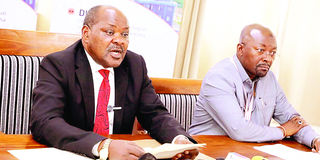Prime
Mixed reactions greet creation of eight new constituencies

Caption: The chairman of the Independent National Electoral Commission, Judge Jacobs Mwambe-gele speaking to journalists in Dodoma yesterday. PHOTO | INEC
What you need to know:
- Political analysts and current members of parliament have noted that the impact of these changes will vary depending on whether key vote-rich areas have been retained or divided. While some MPs may benefit from more manageable constituencies, others are concerned about losing their electoral strongholds.
Dar es Salaam. The recent decision by the Independent National Electoral Commission (INEC) to create eight new parliamentary constituencies has sparked mixed reactions among political stakeholders, with many describing the move as both “sweet and bitter.”
This change increases the total number of constituencies to 272 across Mainland Tanzania and Zanzibar, and it is set to take effect in the upcoming general election later this year.
Political analysts and current members of parliament have noted that the impact of these changes will vary depending on whether key vote-rich areas have been retained or divided. While some MPs may benefit from more manageable constituencies, others are concerned about losing their electoral strongholds.
According to INEC chairperson Judge Jacobs Mwambegele, the new constituencies include Kivule (from Ukonga), Chamazi (from Mbagala), Mtumba (Dodoma Urban), Uyole (Mbeya Urban), Bariadi Urban (Bariadi), Katoro (Busanda), Chato South (Chato) and Itwangi (Solwa).
Judge Mwambegele explained that the division was guided by four main criteria: a population thresh-old of 600,000 in urban areas and 400,000 in rural areas; the capacity of the National Assembly cham-ber; the number of special seat MPs; and the principle that no constituency should span more than one district or local authority.
In addition to creating new constituencies, several existing ones have also been renamed. Chato is now Chato North, Nkenge has become Missenyi, Mpanda Rural is renamed Tanganyika, and Buyungu is now Kakonko. Other name changes include Bariadi (now Bariadi Rural), Manyoni East (now Man-yoni), Singida North (now Ilongero), Manyoni West (now Itigi), Singida East (now Ikungi West), and Handeni Rural (now Handeni).
INEC has also announced the creation of five new wards, bringing the total number of wards in the country to 3,960. The new wards include Ngereyani and Sinonik in Longido District Council, and Mupi, Bwawani Urban, and Shela in Rufiji Town Council.
Political implications
A former MP with more than two decades of experience, who requested anonymity due to his cur-rent official position, stated that the redistricting could either help or hinder incumbents depending on how their support bases are affected. “If a popular area is removed from a constituency, it could spell trouble for the incumbent. But if their stronghold is preserved, that becomes an advantage,” he ex-plained.
Mbagala legislator Abdallah Chaurembo, whose constituency has now been split into Mbagala and Chamazi, remarked that the impact of these changes largely depends on the relationship between lawmakers and their constituents.
“If you’ve served your people well, both sides may want you to stay. I’m now in a dilemma because I’m accepted in both areas,” he said, noting that he has homes in both constituencies and is still mulling where he will run. “Fortunately, when rumours of the split started, I continued serving all parts of the constituency equally,” he added.
Economic costs
Economist Prof Benedict Mongula observed that while these changes could enhance service delivery, they may also lead to increased administrative costs. “Redistricting is meant to improve efficiency and bring services closer to citizens. However, if the new leadership fails to perform, the extra costs could become a burden on the government,” Prof Mongula said.
Meanwhile, some analysts have raised questions about the rationale behind the divisions. Dr Phile-mon Mtoi, a political historian at the University of Bonn in Germany, noted that the population figures for the split constituencies appear inconsistent. “For instance, Mbeya Urban was split despite having a smaller population than Kigamboni. This raises concerns that some changes may have been politically motivated,” he said.
He added that although INEC provided a technical explanation, the move seems to favour certain poli-ticians who may be at risk of losing their seats.
“In other democracies, there are 600 or 700 MPs to ensure equitable representation. Has this redis-tricting considered such principles of fairness and balance?” he questioned.





